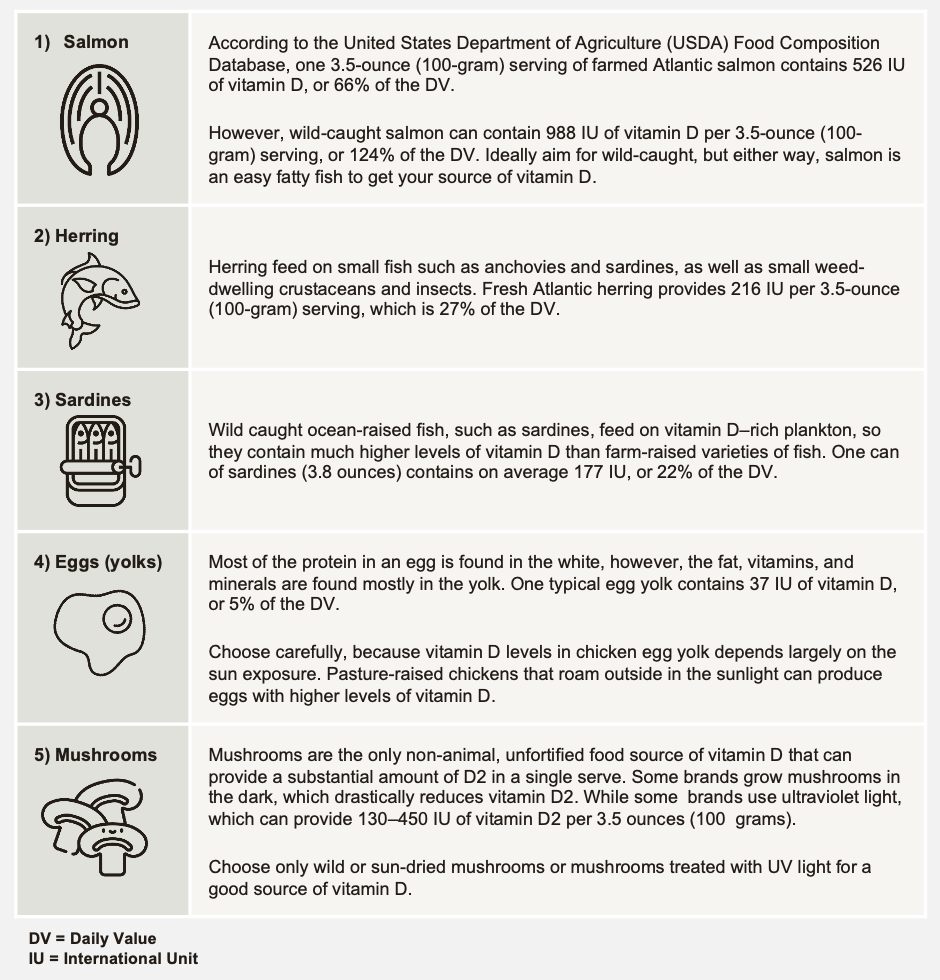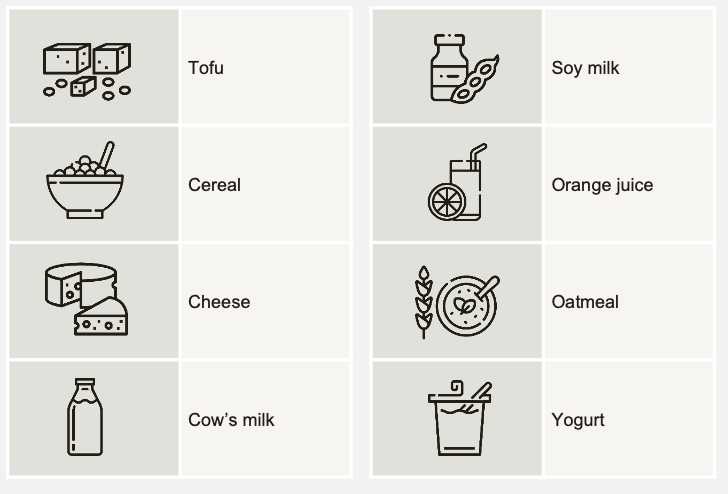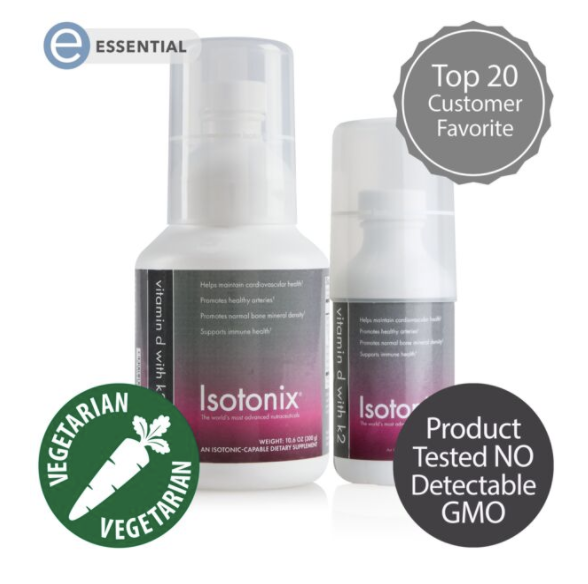Vitamin D Reboot-Why You Need More of the ‘Sunshine’ Vitamin and 5 Best Vitamin D Rich Foods

Imagine a world without the sun's heat and light…life on Earth would not exist.
Up to 50% of the world's population might not be getting enough sun, leaving many people deficient in vitamin D, the only nutrient your body produces when exposed to sunlight.
This is partly because people are spending more time indoors, wear sunscreen outside, and eat a diet low in quality sources of vitamin D.
With world-wide attention focused on the importance of vitamin D, here’s what you need to know.
What is Vitamin D?
Vitamin D is a micronutrient that is needed for optimal health throughout your whole life.
It is a fat-soluble vitamin, meaning that it dissolves in fat/oil and can be stored in the body for long periods of time. There are two main forms, D2 and D3; D3 being more effective.
Vitamin D is also unique, because it is both a nutrient we eat, and a hormone that our body makes from exposure to sunlight, which is why it is often named the ‘sunshine’ vitamin.

While vitamin D affects various cells related to bone health – like telling the cells in the gut to absorb calcium and phosphorus – but scientists have now generated a strong body of evidence supporting vitamin D as an indispensable hormone, required for regulation of many physiologic functions.
Research shows that vitamin D receptors are present in nearly every tissue and cell in the body, and adequate vitamin D is essential for optimal function of these tissues and cells to carry out important roles, including: reduction of inflammation, modulation of cell growth, immune function and glucose metabolism.
Vitamin D Benefits:
- Promotes elasticity of blood vessels
- Helps maintain normal blood pressure
- Promotes healthy arteries
- Supports immune health
- Helps maintain bone health
Simply put: Sufficient levels of vitamin D are essential for disease prevention, longevity, and optimizing human health.
A Global Health Concern
Vitamin D deficiency is a global health problem. With all the medical advances of the the past few decades, vitamin D deficiency is still prevalent. Over a billion people worldwide are vitamin D deficient or insufficient. Somewhere around 40% of the U.S. population is Vitamin D-Deficient.
How to Get Your Dose.
The major source of vitamin D is direct sunlight exposure. Unveiling bare arms and legs for 5 to 30 minutes between 10:00 AM and 3:00 PM is often adequate to meet vitamin D requirements. But this can vary depending on skin pigmentation and other factors.
Vitamin D obtained from summer sunlight can be stored in our bodies for a long period, however many people cannot store enough to see them through the winter months.
Variables such as age can also affect the amount of vitamin D converted in the skin. The cholesterol precursor in the skin (7-dehydrocholesterol) for vitamin D2 and vitamin D3, decreases as we age. In fact, it decreases at a rate of 50% between the ages of 20-80. This inhibits the amount of vitamin D3 older people can make.
Thankfully, you don’t have to rely solely on the sun. Vitamin D dietary supplements are safe and inexpensive, and are becoming widely available. But ideally exploring whole-foods like oily fish and mushrooms can deliver a good source of vitamin D.
Here's 5 best foods for vitamin D, that should be on your shopping list:

Fortified Foods:
Natural sources of vitamin D are limited, especially if you're vegetarian or plant-based. Fortunately, over the past few decades, many foods have been fortified with vitamin D.
These can include:

The Upshot.
Get outside as often as you can. Even sitting in your garden for 10-15 minutes in the mid-day sun will help. If you work in an office, take your lunch break outside.
Starting a new outdoor hobby can also help you spend time in the sun, like running, bike riding, surfing, or simply walking daily. These are all great ways to get your daily dose of vitamin D.
Remember: Eating plenty of vitamin D-rich foods will help you keep on top of this essential micronutrient.
Looking for a quality Vitamin D supplement?
Here's what I take. The benefit for me is that it comes in a powder form that I mix with water and drink it. I love this feature because swallowing tablets or capsules isn't on my list of favorite things to do! So it's easy to stay compliant.

This product has super high quality ingredients and has extremely high bio-availability and absorption. "It is delivered to the body in an isotonic solution. This means that the body has less work to do in obtaining maximum absorption. The isotonic state of the suspension allows nutrients to pass directly into the small intestine and be rapidly absorbed into the bloodstream.With Isotonix products, little nutritive value is lost, making the absorption of nutrients highly efficient while delivering maximum results."
Here's a link if you'd like to check it out.
As with any change in your diet, always consult your physician.
Keep in mind that we may receive commissions when you click our links and make purchases. However, this does not impact our reviews and comparisons. We try our best to keep things fair and balanced, in order to help you make the best choice for you.
Sources and Further Reading
Vitamin D Deficiency- An Ignored Epidemic
https://www.ncbi.nlm.nih.gov/pmc/articles/PMC3068797/#b1-ijhs-4-1-005a
Vitamin D deficiency: A single centre analysis of patients from 136 countries.
https://pubmed.ncbi.nlm.nih.gov/26877203/
Comparative analysis of nutritional guidelines for vitamin D.
https://pubmed.ncbi.nlm.nih.gov/28387318/
William B. Grant, PhD, and Michael F. Holick, PhD, MD. Benefits and Requirements of Vitamin D
for Optimal Health: A Review
https://pubmed.ncbi.nlm.nih.gov/15989379/
https://altmedrev.com/wp-content/uploads/2019/02/v10-2-94.pdf
Lips P, Hosking D, Lippuner K, Norquist JM, Wehren L, Maalouf G, et al. The prevalence of vitamin D inadequacy amongst women with osteoporosis: An international epidemiological investigation.
https://onlinelibrary.wiley.com/doi/full/10.1111/j.1365-2796.2006.01685.x
H F DeLuca. The control of calcium and phosphorus metabolism by the vitamin D endocrine system.
https://pubmed.ncbi.nlm.nih.gov/7015957/
H F DeLuca, H K Schnoes. Vitamin D: recent advances.
https://pubmed.ncbi.nlm.nih.gov/6311080/
Joan M. Lappe, PhD, RN, FAAN. The Role of Vitamin D in Human Health: A Paradigm Shift.
https://journals.sagepub.com/doi/pdf/10.1177/1533210110392952
Li X, Liu Y, Zheng Y, Wang P, Zhang Y. The effect of vitamin D supplementation on glycemic control in type 2 diabetes patients: A systematic review and meta-analysis.
https://pubmed.ncbi.nlm.nih.gov/29562681/
Human Nutrition and Health (IB, AF, FFR), and Nutrition Science & Advocacy (PW, ME), DSM Nutritional Products Ltd., Basel, Switzerland. Vitamin D: a critical and essential micronutrient for human health.
https://www.frontiersin.org/articles/10.3389/fphys.2014.00248/full
Mousa A, Naderpoor N, Teede H, Scragg R, de Courten, B. Vitamin D supplementation for improvement of chronic low-grade inflammation in patients with type 2 diabetes: A systematic review and meta-analysis of randomized controlled trials.
https://pubmed.ncbi.nlm.nih.gov/29490085/
A Review of Mushrooms as a Potential Source of Dietary Vitamin D.
https://www.ncbi.nlm.nih.gov/pmc/articles/PMC6213178/
United States Department of Agriculture (USDA) Food Composition Database.


